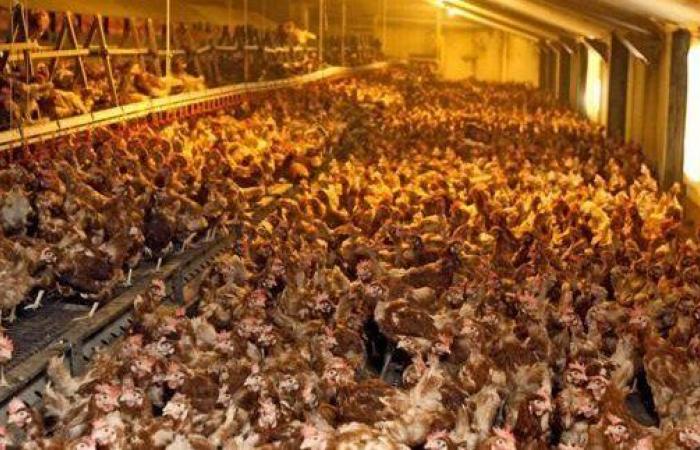The market economy and its supporters continue everywhere to carry out ecocidal and anti-social projects. In Peyrins in Drôme, there is a huge industrial poultry house project from the industrial giant DUCsubsidiary of the Dutch group A PICKwho is still in the running, supported by the prefect of Drôme, still there to support a rotten project, against the advice of the town hall of Peyrins.
Capitalism and statism are obliged to always grow to stay afloat, and therefore to ravage everything through productivism and extractivism, but it is possible to live well without capitalism or statism.
Further information and a petition from the local association PESDC who is fighting against this project.
Some info (August) here:
“It’s ecological and social nonsense”: in Drôme, the project for a “mega chicken coop” divides local residents and farmers – The prefect of Drôme has just given his agreement for the extension of a farm in Peyrins, to increase from 30,000 to 143,000 chickens. Something to worry some local residents and animal rights activists.
on the giant Plukon: Plukon, a raptor on the poultry market – What is Plukon Food Group, this Dutch group that bought the Duc company in 2017 ? A new situation in the Netherlands, with a reduction in breeding and control of nitrogen emissions, is motivating its international expansion. An investigation in collaboration with Lighthouse Reports and Follow the Money.
(…) Around a third of the chickens found in fast food chains such as McDonald's or Kentucky Fried Chicken, and on the shelves of supermarkets such as Lidl or Albert Heijn, come either from Plukon or from LDCor from Myronivsky Hliboproduct. Clearly, there is a good chance that you who are reading us have already eaten a piece of these chickens. And, according to experts, their market share is only growing.
(…)
The three behemoths of the chicken industry are leaving other competitors far behind them. The cost, for the autonomy of breeders, is enormous. A decreasing number of independent feed mills, hatcheries or slaughterhouses in their surroundings means that if they want to change suppliers or raise a different breed of chicken, they are likely to end up with a subsidiary of the same society, the same diet, the same strain of chicks. In other words, very little change.
Because this strategy of all-out buyouts goes hand in hand with a certain standardization of production. After the acquisition of Duc in Chailley, in Yonne, Plukon stopped the production of organic chickens and certified chickens there. The standard, fast-growing chicken became the sole product, without farmers under contract with the industrialist having a say.
(…)
The chicken that now grows on French farms under contract with Duc-Plukon is the “ Ross 308 » ; an exemplary development of the intensification of the broiler industry in recent decades.
Because the Ross 308 is a breed obtained by genetic selection and its growth is extremely efficient. It was developed by the reproduction company Aviagen, owned by the discreet billionaire Erich Wesjohann, whose empire includes more than 140 agri-food companies around the world. The parent company, EW Group, holds the genetic material of dozens of breeds of fish and poultry. And spends heavily on research and development on these strains, with one objective: to ensure that genetics make the animals grow faster, that they produce more meat, while consuming as few calories as possible. This is how the Ross 308 chicken thrives on a precise diet in buildings where everything is automated and computerized.
(…)
These compound feeds, which will lead to optimal growth of the chicken, are largely based on soy. A problematic resource: the large-scale use of this food is driving deforestation in South America and causing considerable displacement, with millions of tonnes of soybeans being transported each year by boat from the Amazon to the north. western Europe.
But, for manufacturers, this business is juicy. This adjustment between genetic strain and diet made it possible to maximize the average weight of animals at slaughter in the standard chicken sector. From 1.9 kg in 2000, it has increased to more than 2.5 kg today.
(…)
It is therefore a sprawling group which is taking shape, and which is gradually taking possession of the French market.
This tight control over the entire production chain through the alliance between EW Group, Plukon and De Heus give enormous power to slaughterhouses over livestock farms.
« Between companies, slaughterhouses and food factories, livestock farms have few alternatives to fall back on. Held by market prices, which leaves them little autonomy, they are in the hands of the market, and therefore of what the industry wants. »
(…)
« In recent years, growth potential has been zero in the Netherlands because the legislation for building permits is complicated, says poultry economist Peter van Horne of Wageningen University. If we also decide to turn to chicken farms which require twice as much space, these large companies will simply cross the border to find the space they need. »
(…)
There are so many obstacles to overcome in the Netherlands that the big companies have started looking beyond borders to move a large part of their production. »
In an interview for the trade magazine Poultry World, the CEO of Plukon itself indicated in 2016, when the group began its acquisitions in France and Poland, that expansion within the Dutch sector itself had become increasingly difficult
(…)
![]() Concentration, sprawling groups, industrial feed, genetically selected poultry, automation, increased dependence of breeders (whether independent or not) on large groups… the ravages of the meat industry are known, but the headlong rush continues .
Concentration, sprawling groups, industrial feed, genetically selected poultry, automation, increased dependence of breeders (whether independent or not) on large groups… the ravages of the meat industry are known, but the headlong rush continues .
Faced with legislation and saturation in the Netherlands, France and other countries are becoming attractive to manufacturers, who are making them simple links in their globalized production chain which mass-produces cheap “chicken”.
Small breeders will not be able to resist the pressures of low prices, waves of epidemics and drastic health standards adapted to large industries such as A PICK.
Apart from a few organic and local niches, capitalism and its inevitable globalized industry will make all breeders disappear, replacing them with simple dependent performers, … while waiting for automated robots.
Unless many people stand up and band together to overturn the table.
Message from the association PESDC Prevention Environment Health Drôme des Collines – Peyrin industrial chicken coop
Bonjour,
As you know, we created the association “ Prevention Environment Health Drôme des Collines » (PESDC) to replace the citizen collective “ Health Environment Peyrins ».
We thank the 60 people who have already joined the association.
For those who have not yet joined and wish to do so, we invite you to follow the following procedure:
- Send an email with your contact details = name, first name, postal address, email, telephone number and amount of your pesdc contribution chez ouvaton.org.
- Place in a sealed envelope in the name of PESDC the amount of your contribution (free amount from €10) indicating your first and last name on the back.
- Give this envelope to a member of the Board of Directors or to the association's headquarters in Peyrins Town Hall, at reception or directly to the association's mailbox. PESDC.
![]() You can also contribute by signing our new petition addressed to the prefect at https://agir.greenvoice.fr/p/petition-poulailler-peyrins.
You can also contribute by signing our new petition addressed to the prefect at https://agir.greenvoice.fr/p/petition-poulailler-peyrins.
Do not hesitate to share the petition in your networks !
The latest information:
Requests for free appeal from project leaders for building permits were rejected by the Mayor of Peyrins.
The requests for voluntary appeal that we sent to the Prefect of Drôme have not received a response to date.
The FRAPNA–DAYsupported by other associations will therefore file an appeal with the administrative court at the beginning of December as announced in the previous email.
We thank you in advance for your help and wish you a pleasant day.
Kind regards
The Board of Directors of the association “ Prevention Environment Health Drôme des Collines » (PESDC)







